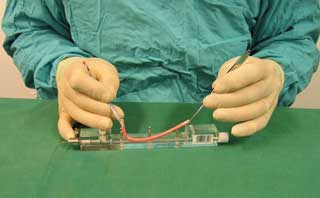Starting the New Year on a positive note, we see that a team of bioengineering researchers at the University of Louisville (Ky.) is working on a new way to dry blood to make it much more portable and durable...
InsiderLouisville.com | Boris Ladwig | January 2 2018
 Credit: Chris Mason. CC BY Today, blood can be stored in refrigerators no longer than 42 days before it has to be discarded, per Food and Drug Administration rules. To store blood longer, it has to go through a cumbersome freezing process that involves the addition of glycerol, which has to be removed during the thawing process. Frozen blood can be kept for 10 years — but it has to be stored in a freezer at -112 degrees Fahrenheit, which makes it costly and impractical for uses in remote locations. The thawing process also takes several hours, which makes it impractical when the blood is needed immediately, such as when a soldier is hemorrhaging from a grievous wound on the battlefield.
Credit: Chris Mason. CC BY Today, blood can be stored in refrigerators no longer than 42 days before it has to be discarded, per Food and Drug Administration rules. To store blood longer, it has to go through a cumbersome freezing process that involves the addition of glycerol, which has to be removed during the thawing process. Frozen blood can be kept for 10 years — but it has to be stored in a freezer at -112 degrees Fahrenheit, which makes it costly and impractical for uses in remote locations. The thawing process also takes several hours, which makes it impractical when the blood is needed immediately, such as when a soldier is hemorrhaging from a grievous wound on the battlefield.
With dried blood, doctors could simply add water and, within minutes, use the rehydrated blood for a transfusion. Soldiers, for example, could carry dried blood in a pack that also contains some water.
The UofL researchers’ approach to drying blood involves the use of trehalose, a sugar that enables some plants and animals to survive long periods — even thousands of years — of extreme dryness.
While other scientists have combined the sugar and blood, the UofL researchers have significantly accelerated the process by firing ultrasound at a solution of blood and trehalose to enable the blood to absorb the sugar. The local researchers’ approach also has significantly increased the share of blood that is viable after drying and rehydration. Read more.
Blood facts
Is blood an organ?
According to the National Organ Transplant Act (NOTA), blood is not an organ. NOTA makes it a crime for any person to knowingly acquire, receive, or otherwise transfer any human organ for valuable consideration for use in human transplantation if the transfer affects interstate commerce.
On the Biology Stack Exchange there is a discussion on whether or not blood is an organ. If it can be viewed to be an organ then it is much easier to argue that organ transplantation is reasonable.
Does blood contain DNA?
Because of the lack of nuclei and organelles, mature red blood cells do not contain DNA and cannot synthesize any RNA, and consequently cannot divide and have limited repair capabilities. The inability to carry out protein synthesis means that no virus can evolve to target mammalian red blood cells. (ref) White blood cells contain DNA but are in minuscule proportion to the red.
Live blood and dead blood
Organ harvesting requires that the person be declared dead while at the same time the blood of a live man flow through the blood vessels. Read more on Dr. Greg Kenyon’s blog. (Dr. Kenyon’s blog feed has been added to Biotech’s Blogroll, below right.)
Does a preborn baby have or use his mother’s blood?
The blood of the fetus does not mix with the blood of the mother. Instead, the placenta provides a system where the two separate blood streams flow past each other with thin separation allowing nutrients to flow between the two streams but the not the blood cells and other large components. (ref)
Mother and child can have different blood types with no problem because they are never shared. That's why women with HIV/AIDS do not pass the virus to their unborn child, most of the time babies get infected during birth, when they go out of the uterus. (ref)
Bloodless surgery the gold standard
It began as a way to allow Jehovah’s Witnesses and others with religious prohibitions on blood transfusions to undergo surgeries. But at some hospitals, bloodless surgeries are now the preferred method for all patients. “If there’s any way to avoid getting a blood transfusion, one is better off in general if they can avoid it,” says Dr. Abe Steinberger, a neurosurgeon at Englewood Hospital in New Jersey. (ref)